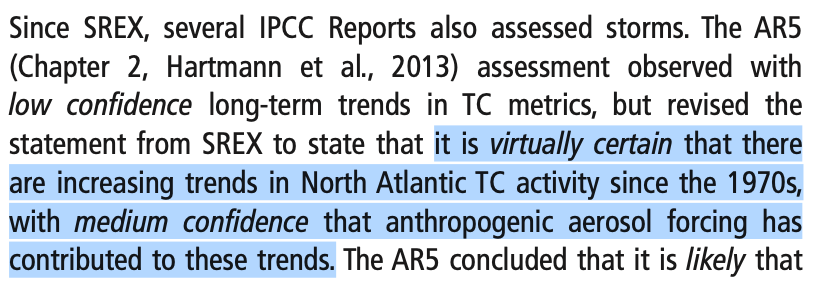Thread by Patrick T. Brown
- Tweet
- Dec 6, 2022
- #Disaster #ClimateChange
Thread
I listened to two @nytimes The Daily podcasts on topics related to climate change and hurricanes this week. Both give the overwhelming impression that we have seen substantial increases in hurricane strength/frequency. That’s just not true.
The first podcast, with @cflav, is about Hurricane Ian and its repercussions on the insurance industry and, thus, real estate in Florida.
www.nytimes.com/2022/10/18/podcasts/the-daily/hurricane-ian-floride-housing-market-insurance.html
www.nytimes.com/2022/10/18/podcasts/the-daily/hurricane-ian-floride-housing-market-insurance.html
A lot of great information, but it frames the situation in terms of climate CHANGE (i.e., hurricanes are substantially stronger & more frequent now) as opposed to simply climate (hurricanes are very damaging, and strong ones can bankrupt insurance companies).
The 2nd podcast, with @dgelles, is about reforms proposed at COP27 to unleash more financial capital to developing nations for adaptation to climate change.
www.nytimes.com/2022/12/02/podcasts/the-daily/barbados-imf-world-bank-climate-change.html
www.nytimes.com/2022/12/02/podcasts/the-daily/barbados-imf-world-bank-climate-change.html
Again the issue is framed as motivated by a supposed drastic increase in storm/hurricane strength, this time in the Caribbean. You get the impression that we are in a new situation now that calls for new solution. Here’s a quote:
“Countries like Barbados are stuck in this cycle of debt and disaster, storms come with increasing intensity and frequency, they borrow money but then have more and more debt they have to repay ...
... and they are stuck paying back debt, trying to recover from one storm, never having the opportunity to prepare for the next storm…”
"They’re not saying abolish the World Bank and the IMF, they’re saying we need you more than ever, but we need you to act in a fundamentally different way to address what is a fundamentally new and unprecedented crisis -that global developing crisis in the form of climate CHANGE"
These claims of increased storm (hurricane) intensity/frequency are made so flippantly that the listener gets the impression that this is a scientific fact. But if it was, you’d think you’d be able to see trends in simple hurricane metrics. Let's look:
The Department of Atmospheric Science and Colorado State keeps an up-to-date database of global tropical cyclone statistics.
tropical.atmos.colostate.edu/Realtime/index.php?arch&loc=global
tropical.atmos.colostate.edu/Realtime/index.php?arch&loc=global
And though the proportion of major hurricane days may be increasing, that does not mean the frequency of major hurricane days is increasing.
Here's global accumulated cyclone energy (a measure of destructive power over the lifetime of a storm)
Those are global. Both Florida and the Caribbean are in the North Atlantic Basin. That is the only basin that has seen an increase in hurricane activity over a multidecadal timespan (since the 1970s).
But the balance of evidence suggests that the period from the 1960s to the 1980s experienced suppressed hurricane activity because of human-caused aerosol emissions. So the uptick since then is mostly a recovery to the more 'natural' level of activity.
www.ipcc.ch/report/ar6/wg1/downloads/report/IPCC_AR6_WGI_Chapter11.pdf
www.ipcc.ch/report/ar6/wg1/downloads/report/IPCC_AR6_WGI_Chapter11.pdf
It is also relevant that most models project a decrease in frequency over the remainder of the century, countering the claim above about "increased frequency and intensity."
This is not to say that climate change does not impact tropical cyclones. It does, increasing rain rates, among other things.
But what the graphs above make clear is that we are not in some radically new situation than we were before. The vast majority of risk from hurricanes is due to living in a climate that naturally produces hurricanes, not due to living in a warmed climate.
Why does coverage of these issues from @nytimes @NYTScience @nytclimate @cflav @dgelles insist on a framing that misleads its audience into thinking we have experienced a dramatic change in hurricane frequency/intensity?












